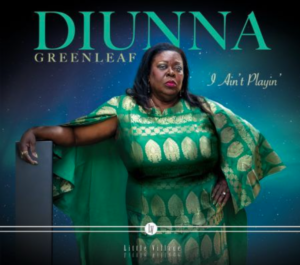 Anyone who remembers Diunna Greenleaf on the national blues scene will likely say this about her latest release: It’s about damn time. Her previous effort, Trying to Hold On, dropped over a decade ago, and things have been quiet domestically for the powerhouse belter from Houston, despite winning the Koko Taylor Award for best female traditional blues artsit from The Blues Foundation in 2014 and 2017. But good things are worth the wait, and it’s hard to imagine Greenleaf topping what she has accomplished here with genius producer and guitarist Kid Andersen of Greaseland (USA) Studio, the Muscle Shoals of the West. Greenleaf and executive producer Noel Hayes selected a baker’s dozen of stylistically varied songs. Then Andersen surrounded Greenleaf with immeasurable talent, most notably legendary bassist Jerry Jemmott (B.B. King, Aretha Franklin, King Curtis, Nina Simone) beside Little Village Foundation founder and keyboardist Jim Pugh and a horn section led by trombonist Mike Rinta.
Anyone who remembers Diunna Greenleaf on the national blues scene will likely say this about her latest release: It’s about damn time. Her previous effort, Trying to Hold On, dropped over a decade ago, and things have been quiet domestically for the powerhouse belter from Houston, despite winning the Koko Taylor Award for best female traditional blues artsit from The Blues Foundation in 2014 and 2017. But good things are worth the wait, and it’s hard to imagine Greenleaf topping what she has accomplished here with genius producer and guitarist Kid Andersen of Greaseland (USA) Studio, the Muscle Shoals of the West. Greenleaf and executive producer Noel Hayes selected a baker’s dozen of stylistically varied songs. Then Andersen surrounded Greenleaf with immeasurable talent, most notably legendary bassist Jerry Jemmott (B.B. King, Aretha Franklin, King Curtis, Nina Simone) beside Little Village Foundation founder and keyboardist Jim Pugh and a horn section led by trombonist Mike Rinta.
On the grittier bluesy numbers, Greenleaf’s hurricane-strength vocals recall Koko Taylor, to whom she does justice with her rendition of Taylor’s “Never Trust a Man.” On this track, as well as Mighty Sam McClain’s “If It Wasn’t for the Blues,” Greenleaf sings in a lower register that’s best suited to unleash her back-pinning force. On the Motown-flavored original “Running Like the Red Cross,” she sings in a higher range, hence the versatility of her pipes.
It doesn’t take long to ascertain that Greenleaf hails from a gospel background. The traditional “I Know I’ve Been Changed” is so uplifting, it conjures up images of a white-robed congregation returning from a river baptism. She’s also a master of turning something secular into something sanctified, such as Vince Gill’s “When I Call Your Name.” It’s a chilling performance, though the ambiance is somewhat deceiving since the story is not about calling the Lord but dejection from a failed relationship. It also shows blues and gospel’s influence on country music.
There’s also a gospel spin on Nina Simone’s civil rights anthem “I Wish I Knew How It Would Feel to Be Free.” At the outset, Greenleaf sings as if she is rehearsing in a church with only an organ accompaniment. As the song builds, she sings with increasing conviction. By the time the joyous horns join in, it’s a revival. Greenleaf sings louder and prouder with the hope that ultimate freedom is still possible.
Of the four originals, two are reprised from earlier recordings. “Sunny Day Friends” is swankier, showing Greenleaf’s ability to handle jazz. “Back Door Man” is not as vocally angry as its earlier version but comical when the protagonist turns the tables.
The sweet soul dance-party song “My Turn, My Time” celebrates a woman’s empowerment and is so topical for Greenleaf at this point in her career. She’s not playing this time.




